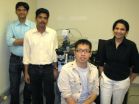(Press-News.org) Patient personality affects the accuracy of reports by friends and family members of mood history and symptoms and can cause missed diagnoses of depression, according to research published online by the journal International Psychogeriatrics.
Friends and family members of a person who is highly outgoing and fun-loving and who is likely to experience happiness and excitement, for example, often miss the signs that indicate the person is depressed.
"When a person who has enjoyed socializing and whose mood normally is positive becomes depressed, friends and family often don't recognize it. Depression is inconsistent with the expectations that people have," said Paul R. Duberstein, Ph.D., professor of Psychiatry at the University of Rochester Medical Center and corresponding author of the journal article.
Missed diagnoses and "false negatives" can have grave consequences for patients with depression or mood disorders, the researchers stated.
Understanding and improving the ability of friends and family to identify depression could enhance the appropriate use of services for depressed older adults and improve the quality of treatment monitoring, the researchers concluded.
The research is based on the study of 191 primary care patients aged 60 or older from the Rochester, N.Y., area and their friends and family members.
Older patients tend to discuss their health concerns with friends and family members, who often accompany them on visits to physicians. Information provided by friends and family members can help identify at-risk individuals.
When the research began, researchers hypothesized that friends and family would miss depression in a person who is introverted.
"But our research showed the opposite to be true," Duberstein said. "We found the signs of depression were more likely to be missed in people with an outgoing, extraverted personality."
The researchers also found that friends and family missed signs of depression in a person characterized as "agreeable," someone who is more trusting and more altruistic or who might be considered a conformist.
"It is important for people to understand that people who are highly extraverted and highly agreeable can become depressed and that the signs of depression for these people are more likely to be missed or detected by friends and family," Duberstein said "Don't assume that because someone is outgoing or agreeable that they are not vulnerable to becoming depressed."
Physicians should be particularly vigilant when interpreting reports from friends and family members of their extraverted or agreeable patients, the researchers stated.
INFORMATION:
The study was funded by the National Institute of Mental Health.
In addition to Duberstein, the article's authors include: Benjamin P. Chapman, Ph.D., Yeates Conwell, M.D., Joanne McGriff, M.D., M.P.H., Nathan Franus, M.S., Silvia Sorensen, Ph.D., Xin M. Tu, Ph.D., Jeffrey M. Lyness, M.D., and Kimberly A. Kaukeinen of the University of Rochester Medical Center; Marnin J. Heisel, Ph.D., of University of Western Ontario, Yan Ma, Ph.D., of the Weill Cornell Medical College, and James C. Coyne, Ph.D., of the University of Pennsylvania.
Patient personality hinders detection of depression
2010-10-08
ELSE PRESS RELEASES FROM THIS DATE:
Reducing blood transfusions improves patient safety and cuts costs
2010-10-08
MAYWOOD, Ill. -- A Loyola University Hospital study has demonstrated how the hospital has improved patient safety and cut costs by reducing the number of blood transfusions.
In 2009, the average amount of blood products transfused per patient at Loyola was 10 percent lower than it was in 2008, saving $453,355. The average amount of blood products transfused dropped from 2.03 units per patient in 2008 to 1.82 units per patient in 2009.
Results were reported at the recent annual meeting of the College of American Pathologists.
"We are giving the right blood component, ...
The elusive intermediary
2010-10-08
Photosynthesis is the process used by plants to convert atmospheric carbon dioxide into the energy-rich chemicals upon which all life-forms depend. The energy trapped in these compounds comes from sunlight, and photosynthetic organisms – plants, algae and certain types of bacteria – capture this energy in a usable form with the help of protein complexes called photosystems. Photosystems include antenna proteins that collect incident light, and green plants have two sorts of photosystems, which respond best to light of different wavelengths. A team of researchers at LMU, ...
Report examines effects of noise and recommends ways to reduce levels
2010-10-08
Exposure to noise is a fact of life. At high levels, noise can damage hearing, and at lower levels it can disrupt sleep patterns, interfere with communications, and even cause accidents. A new National Academy of Engineering report characterizes the most commonly identified sources of noise, looks at efforts that have been made to reduce noise emissions, and suggests ways to decrease exposure in workplaces, schools, recreational environments, and residences.
Development of noise control technology needs immediate attention, said the committee that wrote the report. America ...
NIH funds advanced development of 3 biodefense vaccines
2010-10-08
###
For more information, visit NIAID's Vaccines Web site at http://www.niaid.nih.gov/topics/vaccines/Pages/Default.aspx and Biodefense Web site at http://www.niaid.nih.gov/topics/biodefenserelated/Pages/default.aspx.
NIAID conducts and supports research-at NIH, throughout the United States, and worldwide to study the causes of infectious and immune-mediated diseases, and to develop better means of preventing, diagnosing and treating these illnesses. News releases, fact sheets and other NIAID-related materials are available on the NIAID Web site at http://www.niaid.nih.gov.
The ...
Despite highest health spending, Americans' life expectancy falls behind other countries'
2010-10-08
October 7, 2010—America continues to lag behind other nations when it comes to gains in life expectancy, and commonly cited causes for our poor performance—obesity, smoking, traffic fatalities and homicide—are not to blame, according to a study by researchers at Columbia University's Mailman School of Public Health. The study looked at health spending; behavioral risk factors like obesity and smoking; and 15-year survival rates for men and women ages 45 and 65 in the U.S. and 12 other nations -- Australia, Austria, Belgium, Canada, France, Germany, Italy, Japan, the Netherlands, ...
Transgenic corn suppresses European corn borer, saves farmers billions
2010-10-08
Transgenic corn's suppression of the European corn borer has saved Midwest farmers billions of dollars in the past decade, reports a new study in Science.
Research conducted by several Midwest universities shows that suppression of this pest has saved $3.2 billion for corn growers in Illinois, Minnesota, and Wisconsin over the past 14 years with more than $2.4 billion of this total benefiting non-Bt corn growers. Comparable estimates for Iowa and Nebraska are $3.6 billion in total, with $1.9 billion accruing for non-Bt corn growers.
Transgenic corn is engineered to ...
Tinnitus in the elderly is prevalent and impacts quality of life
2010-10-08
Alexandria, VA — Tinnitus is common among elderly Nigerians and associated with treatable health conditions like otitis media, rhinosinusitis, head injury and hypertension, according to new research published in the October 2010 issue of Otolaryngology – Head and Neck Surgery.
Nearly 36 million Americans, however, suffer from tinnitus or head noises. It may be an intermittent sound or an annoying continuous sound in one or both ears. In Nigeria, tinnitus affects between 10.1% and 33% of the population, with about 3 to 4% consulting a doctor on at least one occasion in ...
New deep-sea hot springs discovered in the Atlantic
2010-10-08
Scientists from the MARUM Center for Marine Environmental Sciences and the Max Planck Institute for Marine Microbiology in Bremen on board the German research vessel Meteor have discovered a new hydrothermal vent 500 kilometres south-west of the Azores. The vent with chimneys as high as one meter and fluids with temperatures up to 300 degrees Celsius was found at one thousand metres water depth in the middle of the Atlantic Ocean. The discovery of the new deep-sea vent is remarkable because the area in which it was found has been intensively studied during previous research ...
Novel protein critical for cellular proliferation discovered
2010-10-08
Accurate duplication of genetic material and the faithful segregation of chromosomes are critical for cell survival. The initiation of DNA replication is linked both to cell cycle progression and chromatin organization. In plants, animals and other "eukaryotes," the assembly of a multi-protein complex called pre-replicative complex (preRC) is the first step in the initiation of DNA replication. As the name implies, origin recognition complex (ORC) proteins bind to origins of DNA replication. Subsequently, other components of preRC are assembled at these sites. In addition ...
An X-ray for your genes
2010-10-08
Prescription drugs and their dosages may be standardized, but not every patient reacts to a medicine in the same way. The personal genetic characteristics of individuals and populations can explain why a specific prescription successfully treats one patient and not another, so medical researchers are adopting the new approach called "personalized medicine" and a Tel Aviv University lab is leading the way.
Dr. Noam Shomron of Tel Aviv University's Sackler Faculty of Medicine is developing a new method for the advancement of personalized medicine, an expanding area of ...


